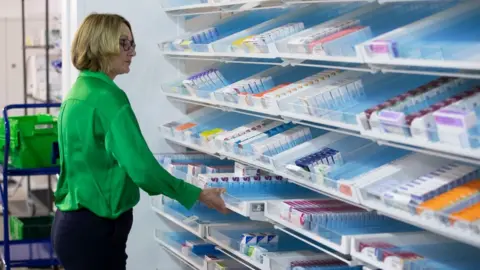MSPs slam 'serious failings' in Scottish medicines system
 Getty Images
Getty ImagesMSPs have called for urgent reforms amid "huge concerns" about Scotland's "incoherent" medicines system.
Holyrood's health committee said there were "serious failings" in the supply of medicines in Scotland, saying the system "fails to put patients first".
Their inquiry found an "almost complete absence of useable data" about whether drugs were effective or even taken.
Convener Lewis Macdonald said there had been "profound failings" of IT systems, which required a "complete overhaul".
The Scottish government said it would work with the committee to make further improvements.
MSPs on the health and sport committee had been conducting an inquiry into how the system of supply and demand for medicines in Scotland operates, with health services north of the border spending almost £1.8bn on drugs each year.
This is a complex field, with purchasing being conducted at a national level - with prices regulated at a UK level - while prescriptions themselves are issued locally.
Members said that a "fundamental problem" quickly became apparent - that "the system of supply and demand for medicines in Scotland does not have a focus on patients".
They said: "Instead, the system is burdened by market forces, public sector administrative bureaucracy and reported under-resourcing, inconsistent leadership and a lack of comprehensive, strategic thinking and imagination, allied to an almost complete absence of usable data."
 PA Media
PA MediaMembers said there had been a "lack of care taken to understand people's experience of taking medicines", with a "staggering" absence of data collection and analysis.
They found that doctors and pharmacists were "instinctively reaching for the prescription pad", but that there was very little if any follow-up to ensure drugs were working or even being taken, with the end result "at best waste, and at worst harm to the patient".
Their report said: "Discussions on whether and how medicines were taken, and the effects of these, are at best being recorded on Post-it notes, and at worst disappearing without record. Patients expect and deserve a better system than this.
"We are extremely disappointed that once again all roads lead to the dismal failure of the NHS in Scotland to implement comprehensive IT systems which maximise the use of patient data to provide better services."
Mr Macdonald, a Labour MSP, said: "Our evidence has made clear once again the profound failings of current health IT systems. These need to be completely overhauled so that data can be gathered, analysed and shared in a systematic way across the NHS.
"The scale of this task is undoubtedly great, but it is essential to quickly deliver a fit for purpose system which would improve patient outcomes, increase efficiency and reduce costs."

The committee made a total of 129 recommendations, including an "urgent" call for practitioners to consider alternatives to prescribing drugs, such as changes in lifestyle.
Members also want to see community pharmacists "play a far greater role in patient care", with their skills and knowledge often "going to waste".
And they suggested that if there were not "systematic changes" in the longer term, ministers should consider whether the model of GPs working as external contractors should continue, saying: "An approach which pays GPs from the public purse with no monitoring or evaluation of their actions is not acceptable."
The Scottish government said in a statement that it had made progress in the collection and use of data "to improve patient outcomes", particularly for cancer treatment and in primary care.
It added: "This approach has been driven by senior clinicians, pharmacists, patients and senior leaders in the health service and we look forward to future developments in this area.
"The Scottish government will work with the committee and a range of stakeholders in taking forward further improvements to the systems that support the supply and demand for medicines and ensuring the best outcomes for the NHS and patients."
Meanwhile the British Medical Association contended that while it was "true we need better prescribing data", it was "unfair to say that GPs and clinicians often just reach for the prescription pad".
Dr Andrew Buist, who chairs the BMA's Scottish GP committee, said moving to electronic prescriptions would be "beneficial for patients, save money, save time and be safer", adding that practitioners were "continually seeking" better data and ways to make improvements.
